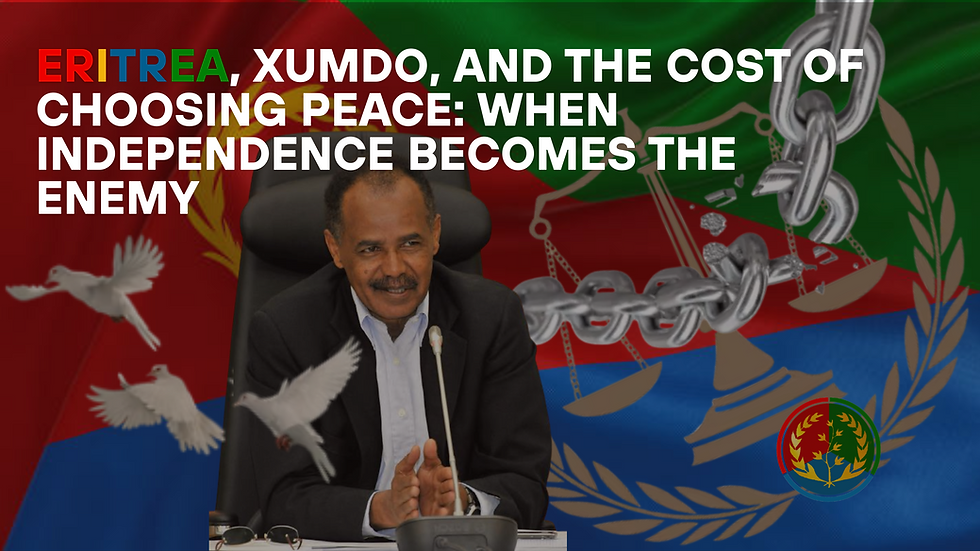The Illusion of Salvation: Trump's Policies and Their Global Repercussions
- Nakfa Eritrea
- Mar 2, 2025
- 4 min read
Introduction
The election of Donald Trump as the President of the United States was heralded by many as a transformative moment, promising significant domestic and international reforms. Supporters anticipated policies that would rejuvenate the American economy, strengthen global alliances, and foster equitable relations with nations worldwide, including those in Africa. However, a closer examination reveals a contrasting narrative. Trump's administration has been characterized by actions that not only contradict the anticipated positive changes but also perpetuate historical patterns of U.S. interventionism and geopolitical manipulation.
Unconditional Support for Israel: Empowering Aggression
One of the most contentious aspects of Trump's foreign policy has been his unwavering support for Israeli Prime Minister Benjamin Netanyahu. This alliance has emboldened aggressive Israeli actions in the Palestinian territories, exacerbating regional tensions. The administration's approval of substantial arms deals, including a recent $3 billion package, has further empowered Israel's military endeavors. These deals were expedited by invoking emergency authorities, effectively bypassing traditional congressional oversight.
Such actions have been perceived globally as the U.S. granting Israel carte blanche to pursue policies that often contravene international law and human rights norms. This perception undermines America's credibility as a neutral mediator in the Middle East and fuels anti-American sentiments across the region.
Ukraine: A Pawn in Geopolitical Chess
In Eastern Europe, Ukraine's experience illustrates how nations can become pawns in the geopolitical rivalry between major powers. The Trump administration's interactions with Ukraine have been marked by inconsistency and strategic ambiguity. A notable incident occurred during a meeting between Trump and Ukrainian President Volodymyr Zelensky, which ended in a heated disagreement. The fallout led to the collapse of a proposed minerals deal that would have granted the U.S. access to Ukraine's valuable natural resources.
This incident underscores the transactional nature of U.S. foreign policy under Trump, where strategic interests often overshadow genuine diplomatic engagement. Ukraine's position as a buffer state between Western powers and Russia has subjected it to external pressures that prioritize geopolitical objectives over the nation's sovereignty and welfare.
Unfulfilled Promises to Africa
Trump's campaign rhetoric included commitments to foster mutually beneficial relationships with African nations. However, the administration's actions have frequently contradicted these promises. For instance, Trump's executive orders have presented both challenges and opportunities for Africa and the Global South, necessitating a nuanced understanding of the new policy environment.
Furthermore, the administration's confrontational stance towards South Africa, exemplified by executive orders addressing alleged human rights violations, has strained bilateral relations. Such actions are perceived as external interference, reminiscent of historical patterns where the U.S. has leveraged its power to influence domestic policies of sovereign nations.
The Eritrean Experience: Punitive Sanctions for Defiance
Eritrea's relationship with the United States offers a poignant example of how deviation from U.S. expectations can result in punitive measures. The imposition of sanctions on Eritrea was largely a response to its refusal to align with U.S. strategic interests in the Horn of Africa. These sanctions have had debilitating effects on Eritrea's economy and have isolated the nation diplomatically.
This scenario reflects a broader pattern where U.S. foreign policy employs economic sanctions as tools to coerce compliance, often disregarding the humanitarian consequences on the affected populations.
The Power Behind the Throne: Financial Oligarchies and Policy Direction
A critical analysis of U.S. foreign policy reveals that presidential directives are frequently influenced by powerful financial entities. The historical meeting at Jekyll Island in 1910, which led to the creation of the Federal Reserve, exemplifies how financial oligarchies can shape national policies. The same financial networks have been implicated in supporting the establishment of Israel, highlighting the intersection of economic interests and geopolitical strategies.
Trump's personal connections, including the naming of a town in Israel after him, further illustrate how financial and political interests intertwine, potentially compromising the impartiality of U.S. foreign policy.
Historical Precedents: U.S. Interventions for Resource Exploitation
The United States has a long history of intervening in foreign nations under the guise of promoting democracy or protecting human rights, while often pursuing economic interests. In Latin America, for example, the U.S. has intervened to change governments, with at least 41 successful interventions between 1898 and 1994.
Similarly, in Central America, U.S. interventions have destabilized regions, leading to long-term socio-economic challenges. These actions have often been driven by the desire to control valuable resources or to establish favorable economic conditions for American corporations.
The Futility of Executive Orders in Addressing Systemic Issues
While executive orders are powerful tools for enacting immediate policy changes, they are limited in their ability to address systemic issues rooted in historical and structural inequalities. Trump's reliance on executive orders has often resulted in policies that lack comprehensive legislative support, rendering them susceptible to reversal by subsequent administrations.
Moreover, without addressing the underlying power structures that influence policy decisions, such as financial oligarchies and entrenched interest groups, executive actions are unlikely to result in substantive and enduring change.
Conclusion
The anticipation that Donald Trump's presidency would usher in transformative policies benefiting the global community, including African nations, has not materialized. Instead, his administration has perpetuated a legacy of interventionism, economic coercion, and alignment with powerful financial interests. This reality underscores the necessity for a more equitable and just global order, where the sovereignty and welfare of all nations are respected, and where policies are crafted through genuine multilateral engagement rather than unilateral decrees
.png)



Comments